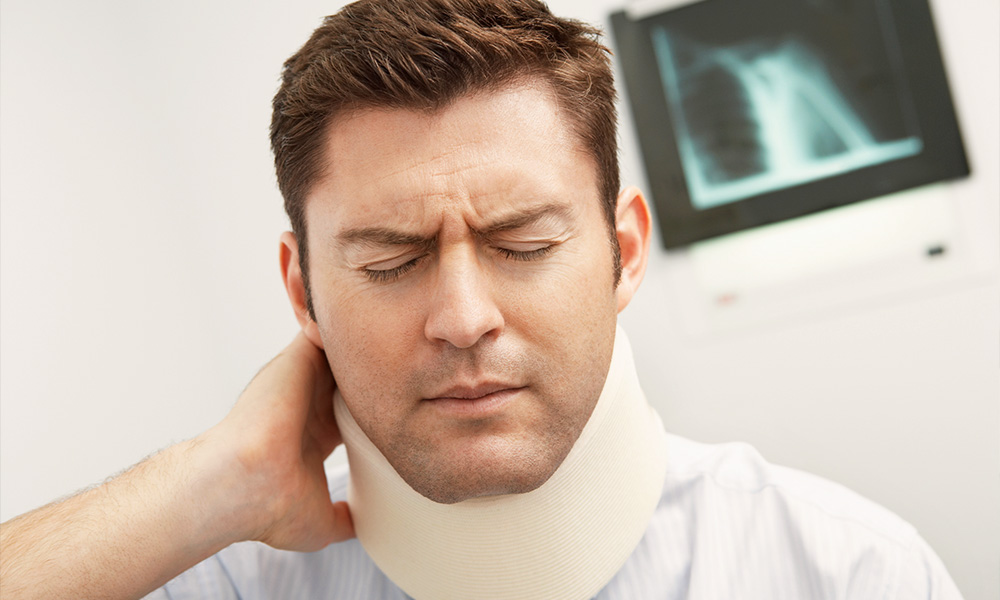
What Are the Most Common Causes and Types of Neck Injuries from Car Accidents?
Your neck is significantly vulnerable to injury during an auto accident. In the days after a crash, pain from mild contusions, severe whiplash, or a fractured vertebra can be excruciating. It’s imperative to protect yourself from long-term complications — and long-term medical bills — by seeking medical attention as soon as pain symptoms develop.
If you or someone you love injured their neck during a car accident, keep reading to learn the symptoms, causes, and recovery time to anticipate, and how an attorney can help protect your right to compensation.
Why Are Cervical Spine Injuries Common in Car Accidents?
The term “cervical spine” refers to the bones, muscles, ligaments, and intervertebral discs that make up your neck. During a crash, this area is not protected very well. A seatbelt may cross over your shoulder but it only restrains what’s below the strap, like your chest. Anything above the seatbelt, like your neck, can move freely with the vehicle’s motion.
When your vehicle is hit from the side, the force of impact will cause your neck to move violently from side to side. If your vehicle is in a rear-end collision, your neck will likely forcibly jerk forward and backward. Your neck is also vulnerable to injuries from flying debris during the collision.
Types of Neck Injuries from a Car Accident
Common neck injuries after a car accident vary, but most commonly include:
- Lacerations and abrasions
- Sprains and strains
- Muscle spasms
- Whiplash
- Slipped or herniated disc
- Pinched nerve and paresthesia
- Neck fracture
- Spinal cord injuries
Lacerations and Abrasions
Lacerations and abrasions are two of the most obvious neck injuries after a car accident. A laceration is a deep wound typically caused by a sharp object, like a piece of broken glass. An abrasion is a type of scrape caused by the removal of the top layer of skin.
Sprains and Strains
Sprains and strains are types of soft tissue damage caused by the stretching of ligaments or the tearing of muscles. A neck sprain often results in bruising and inflammation around the injury site. A neck strain often causes muscle spasms at the point of injury.

Muscle Spasms
Also known as a muscle cramp, a muscle spasm is an involuntary contraction of your muscle. While painful on their own, muscle spasms are often the result of a primary injury, such as a neck strain. Muscle spasms are unpredictable and often feel like an uncomfortable, tight sensation in the neck.
Whiplash
A whiplash injury is the partial or complete tear of the muscles, tendons, and ligaments in your neck. This type of neck injury is caused when the force of the impact sends your head flying forward and snapping backward, damaging the soft tissue of your neck. A whiplash injury can also damage surrounding facet joints and intervertebral discs, quickly becoming a costly injury.
Slipped or Herniated Disc
An intervertebral disc is a gel-like cushion that rests between each bone of your spine, called vertebrae. During an auto collision, the force of impact can shove these discs out of their respective place in the spine, creating what’s known as a slipped disc.
In more severe cases, the force of impact can rupture the exterior of the intervertebral disc, causing the soft interior to leak into the spinal canal. This type of neck injury from a car accident can have several painful side effects, including a pinched nerve.
Pinched Nerve and Paresthesia
A pinched nerve is a common side effect of accident-related neck injuries. A pinched nerve occurs when structures of the cervical spine shift or become swollen and press on spinal nerves.
When a nerve becomes compressed, it can no longer properly process pain signals. As a result, \Paresthesia can occur, causing tingling, burning, numbness, or shooting pain.
Neck Fracture
A cervical fracture occurs when one of the seven bones in your neck (vertebrae) is broken or cracked. A fractured vertebra can cause immense pain and a limited range of motion. In severe cases, a neck fracture can injure your spinal cord and potentially cause paralysis.
Spinal Cord Injuries
Your spinal cord is a column of essential nerves and soft tissue that runs from the base of your skull to your lumbar spine (lower back). Your vertebrae protect this delicate structure. When one of your vertebrae breaks or suffers damage, or your neck or back receives a direct blow, it can result in a spinal cord injury. This is a severe neck injury that can result in paralysis.

Symptoms of a Neck Injury After Car Accident
Symptoms of a neck injury will vary depending on the type of structure you’ve damaged. A neck strain can cause muscle spasms, where a slipped disc can cause unpredictable nerve pain.
Common symptoms of a neck injury include:
- Sore neck
- Headaches
- Blurred vision
- Neck stiffness
- Shoulder pain
- Loss of range of motion
- Pain with a sudden motion
- Pain that is sharp, shooting, tingling, or dull
- Pain that radiates to the shoulders, arms, and fingers
How Long Before Neck Injury Symptoms Appear After an Accident?
Some neck injuries can show symptoms immediately after an accident, especially severe neck injuries like a fractured vertebra. However, it may take several hours or even several days for signs and symptoms of other neck injuries to appear. Whiplash injury symptoms like headaches or blurred vision may not begin for more than 24 hours after the accident.
How Long is the Recovery From Neck Injuries?
How long neck pain lasts depends on the type of injury and whether or not you seek medical treatment.
Recovery from minor injuries sustained in a car accident can take three to four weeks. More severe injuries, such as a bone fracture, can take six to eight weeks to heal. Spinal cord damage or related serious injuries can be life-long or result in chronic pain.
What to Do After a Neck Injury from a Car Accident
If you or someone you love has sustained a neck injury from a car accident, do not wait to receive medical care. the first step to protecting your health and your chance to recover damages is seeking medical attention. Then, find a personal injury law firm that can help you file an injury claim.
1. Seek Immediate Medical Attention
If left untreated, accident-related neck injuries can cause chronic neck pain and limited range of motion. In addition to being incredibly costly, these crash injuries can dramatically impact daily activities like getting dressed, going to work, and spending time with loved ones. Visit a medical expert to receive a physical exam, medical imaging, and diagnosis for your injury.
2. Continue Treatment for the Accident Injury
With a diagnosis in hand, be sure to adhere to your treatment plan as recommended by medical staff. A complete episode of care is necessary for a full recovery and gives you the best chance of receiving compensation.
Your treatment plan may include:
- Chiropractic care
- Physical therapy
- Massage therapy
- Muscle relaxants
- Prescription painkillers
3. Seek the Help of a Knowledgeable Attorney
While you focus on your treatment plan, allow a car accident attorney to focus on gathering documentation for your injury. Insurance companies will anticipate a thorough description of how your neck was injured and the required medical expenses. An attorney can handle the paperwork to ensure you have a strong personal injury case.
4. File a Personal Injury Claim
To continue with medical treatment for your car accident neck injury, you may require additional funds. You may also need compensation for your previous medical expenses and out-of-pocket costs relating to the injury.
A car accident attorney can file a personal injury claim on your behalf to recoup damages like:
- Out-of-pocket costs, such as travel to a doctor
- Past and future medical bills
- Loss of enjoyment of life
- Pain and suffering
- Lost wages
For more information on what to do after a car accident with injuries, we’ve put together this 12 step guide.

How Much Are Neck Injury Claims Worth?
Many accident victims wonder how much neck injury claims are worth. In many cases, the value of a neck injury claim is considerably high. Neck injuries are costly, both in terms of medical bills and the impact on accident victims’ quality of life. Painful neck injuries can mean some victims may never return to their previous job or even their preferred lifestyle.
Due to the extreme repercussions of neck injuries, the national average neck injury settlement is $925,169. The median settlement is just over $300,000.
Contact a Personal Injury Attorney for Your Neck Injury Today
Suffering a neck injury after a car accident can be a frightening experience. While receiving physical examinations, driving to medical appointments, and managing pain symptoms, you shouldn’t feel forced to handle your own injury claim, too. A knowledgeable personal injury attorney is waiting to help you fight for fair compensation.
With the average settlement for a neck injury topping off at more than $900,000, do not risk filing your injury claim alone. Instead, contact The Miley Legal Group for help combating these extraordinary costs. Send us a message to receive a free consultation today.

